Extractivism Flying Academy Tunisia 2023 – International Conference
CALL OF PAPERS
Extractivism and rent: reconfigurations in the Maghreb
MECAM, Tunis, Tunisia, 24-25 October 2023
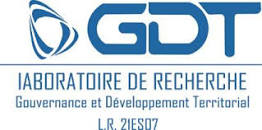
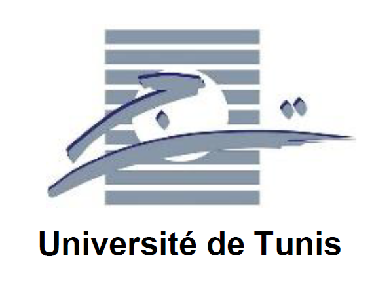

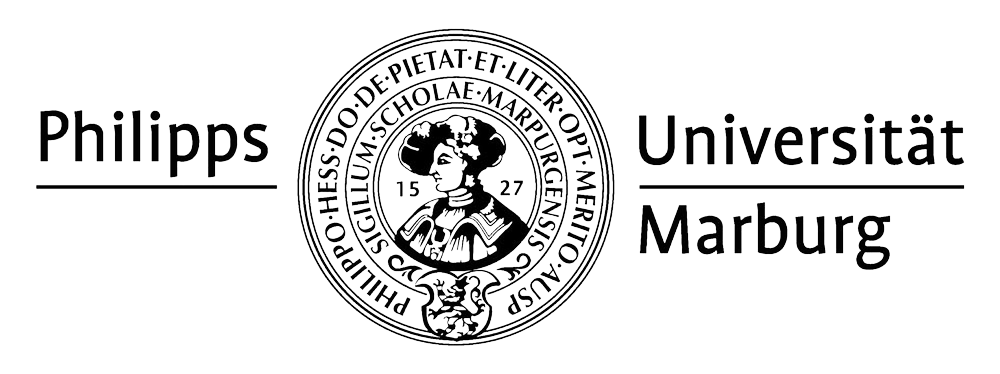

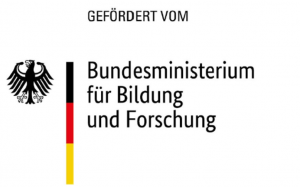
Description
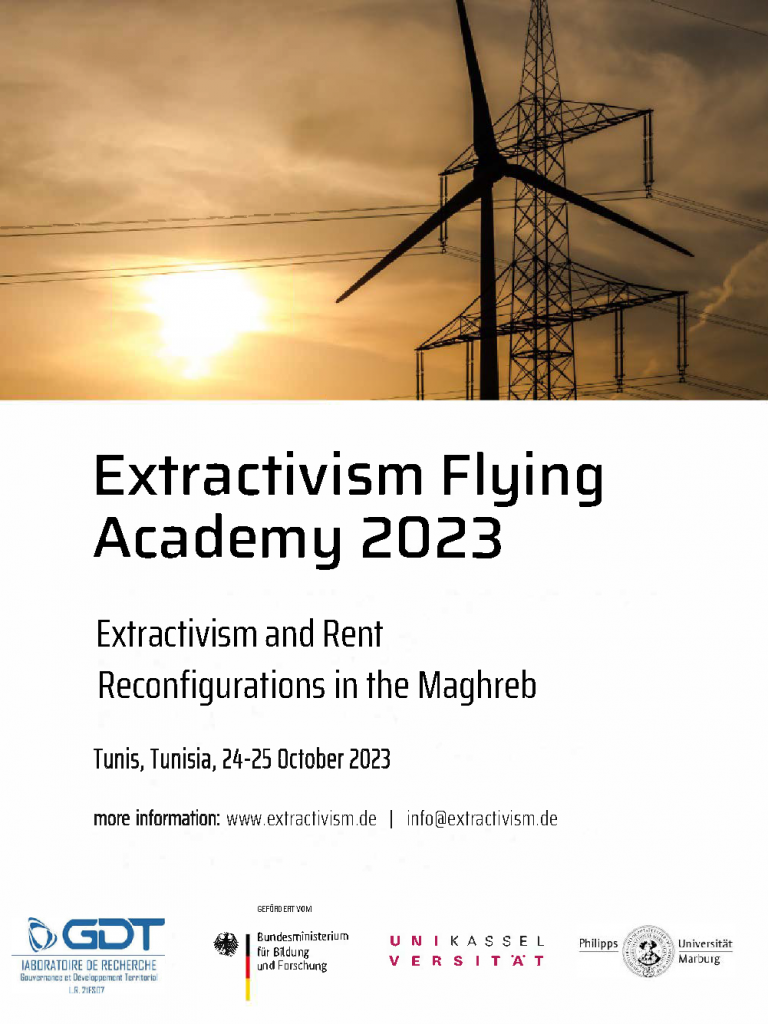
The Maghreb and Middle East region has been experiencing profound political and economic transformations and reconfigurations in recent decades. Firstly, due to the socio-political convulsions and massive protests of the «Arab Spring» of 2011. Mobilizations that in some cases culminated in revolutions and the deposing of heads of state, as in the case of Egypt and Tunisia, while in others they triggered some modest reforms, as was the case in Jordan and Morocco, but also civil wars as in the case of Yemen and Libya. Later, in 2019, another round of protests was triggered in Sudan, Algeria, Lebanon and Iraq, where socio-economic malaise was the main cause.
Consequently, the economic dimension has also changed significantly in the last decade. While socio-political crises were largely provoked by economic problems, the global recession is now affecting national economies on an undifferentiated basis. The Maghreb countries lack the tools to confront the crisis. Firstly, the Covid-19 pandemic has hit the Maghreb markets hard and the already limited labor supply has suffered. Secondly, the war in Ukraine has caused inflation and instability in these countries. In addition, the short supply of raw materials in Europe and climate change raise important questions. For example, socio-environmental disturbances, as the European «Green Deal» poses major energy challenges, an issue that must also be addressed in the Maghreb. But, at the same time, it also creates uncertainties, in a context of war in which this region also has significant advantages to gain. Now, although changes in economic strategies are observed in different regions of the world, the Maghreb countries do not seem to have any strategy to overcome the rentier logic. However, despite these major transformations, the development model previously adopted, in other words, extractivism or commodity rentierism, has remained intact.
The extractivist and rentier model has brought stability to authoritarian regimes and restored the status quo in many of these states. This stability can also be observed in the political behavior of the main interest groups: the middle classes. This stability was threatened as soon as these States began to change the way they exploited and managed their subsoil resources in the 1990s, as a consequence of the reforms imposed by the new context of globalization: a multidimensional crisis emerged in these territories.
Extractivism is not only understood as the extraction of raw materials, production or export, but is also linked to distributive aspects. However, in the case of the MENA region in general and the Maghreb in particular, these are rentier middle classes and not market-oriented middle classes in Weber’s sense. Since independence, political leaders and governments have associated increased revenues from the export of raw materials with economic and social development. This is a myth because extractivism is risky (prices are volatile), a threat to nature (oil spills, deforestation, etc.) and this model is contested (social movements against extractivism). In short, the concept of extractivism includes civil society and different actors, conflicts and social movements. On the other hand, the concept of the rentier state includes states, their institutions and the constellation of actors that gravitate around them, as well as classes (the middle class plays a central role).
This raises a number of questions on the socio-political reconfigurations of class, the interweaving of social and income orders in the Maghreb region, but also on the social and environmental crises of the territories. In a first dimension, we would like to understand the behavior of the middle classes in the past, at present and in the years to come. We would also like to understand the coalitions and groups that form within the middle class and with the middle class. Is the rentier model a stable model or has it undergone visible transformations in the Maghreb countries? Is this model observed in the same way in the countries of the region or are there interesting contrasts? The main question is whether the rentier middle classes are willing to support projects such as the Green Deal. In the second dimension, it is a question of analyzing the effects of globalization and the reforms imposed on the modes of extraction in the territories of «extraction» by focusing on the multidimensional crises of these territories (environmental, social and economic).
From these elements, innovative approaches to answer these questions can be observed according to the different contexts of the Maghreb region, thus deepening regional similarities as well as comparisons between the different countries. Therefore, this international conference wishes to address these questions by focusing mainly on actors and territories. Actors such as the middle classes that produce the persistence of the rentier and extractivist model, as well as other relevant actors that, on the contrary, seek its transformation. But also the territories (mining, oil, forestry…) that are going through a structural crisis at all levels. In this way, we will observe the new configurations that emerge in this new cycle.
Thematic lines
This more theoretical panel asks how to carry out a fair energy transition in the Maghreb, beyond the attempts at transformation by companies, governments and actors who seek rather to benefit from this new cycle and manufacture a clean reputation for themselves. This doesn’t necessarily imply substantial changes that will strengthen the economies of these countries and their citizens. Therefore, the main questions raised here are: what are the main challenges facing the Maghreb countries in this energy transition? What are the constraints faced by these governments to develop a just and sustainable transition?
The middle classes in the Maghreb have been crucial in providing stability to their governments and facing the crises of recent years. We are interested in how these middle classes are changing and how they interact with other groups. We want to know whether the Maghrebi middle classes are in constant dialogue with other actors, such as the global middle classes, ruling elites and international actors. In addition, differences and similarities within the Maghreb and within the countries where these elements are found will be explored.
Extractivism has a significant impact on populations and territories. Extractive activities destroy the natural environment, disrupt the social organization and lifestyles of inhabitants and influence local economies, thus weakening the social cohesion of local communities, affecting people’s health and disrupting the local economy, particularly the agricultural sector. These territories are now living in a perpetual crisis and are becoming territories in crisis. This is the case, for example, of the Gafsa mining basin in Tunisia, which has been transformed into a disputed territory, implying a change in development models and an in-depth review of public policies linked to income.
In this panel, we essentially ask ourselves what are the effects of reforms linked to the rentier economy on territories, in particular on issues related to the environment, territorial development, unemployment, clientelism and corruption.
The constellations of actor groups that converge with the middle classes include the technocracies and governing classes that play a central role in the Maghreb. In this panel, we would like to discuss the different conceptualizations developed about these groups, how they are understood in the different countries of the region and whether there are differences and similarities between them. What are the main contrasts identified, what are their trajectories and particularities. Likewise, to analyze how these groups relate to other actors, such as political and economic elites, as well as to other technocracies and dominant classes at the global level. Finally, to understand their strategic role in the persistence of the extractivist or rentier model in Maghrebi societies.
The transition to non-fossil fuel energy and the path of socio-ecological transformation in Europe represent enormous challenges for the Maghreb countries. They play a decisive role in the production of green energy and the raw materials needed for the energy transition. Whether it is solar energy, wind energy or green hydrogen, the region’s economies are already gearing up for future needs. New sources of revenue are also expected to be tapped. The panel asks whether these new sources of income displace traditional political structures, bring about new constellations of actors and prove to be drivers of social change, or whether they reinforce existing power models and distribution structures.
Call of Papers:
The call is for researchers in the social sciences and humanities who can contribute with significant reflections on at least one of the topics of the call.
Application: The researchers who are interested should send their application to in a single pdf document of a maximum of one page, with the following information
● Presentation title
● Authors (names, institution or organization)
● Abstract of a maximum of 250 words with key words (no more than 5)
Details of the application:
● Deadline for submission of proposals: 15. May 2023.
● Language: English or French
● An academic committee will select papers on the basis of their excellence. Applicants will be informed by June 31, 2023 of the decision on their application.
The collaborative project Extractivism.de will cover costs for accommodation. There will be limited resources to cover travel expenses to Tunisia.